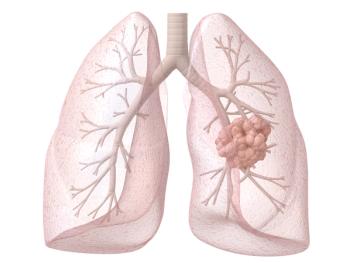
Compared with immediate prior therapy, selpercatinib resulted in a greater proportion of objective responses in patients with non–small cell lung cancer whose tumors harbor RET fusions.

Your AI-Trained Oncology Knowledge Connection!



Compared with immediate prior therapy, selpercatinib resulted in a greater proportion of objective responses in patients with non–small cell lung cancer whose tumors harbor RET fusions.

Patients with pretreated KRAS p.G12C–mutated NSCLC experienced a continued durable clinical benefit with sotorasib.

For heavily pretreated patients with EGFR-mutated NSCLC resistant to EGFR TKIs, patritumab deruxtecan induced clinically meaningful and durable efficacy.

Some patients who progressed on osimertinib had a response to therapy with amivantamab and lazertinib, and these were seen regardless of known resistance mechanisms to EGFR inhibitors.

Patients with non-small cell lung cancer receiving alectinib did not have better results than patients receiving crizotinib.

A phase 1 trial of the investigational agent CLN-081 indicates antitumor activity coupled with a tolerable safety profile as treatment of patients with non–small cell lung cancer and EGFR exon 20 insertion mutations.

Two-year efficacy and safety data from a pivotal trial of nivolumab/ipilimumab plus chemotherapy as treatment of non–small cell lung cancer support the continued use of the combination.

Data presented at the 2021 ASCO Annual Meeting from the phase 3 PACIFIC trial show long-term survival benefit for patients with unresectable stage III non–small cell lung cancer treated with durvalumab following chemoradiotherapy.

A positive efficacy and safety profile persists with pralsentinib in RET fusion–positive non–small cell lung cancer, according to data presented at the 2021 ASCO Annual Meeting.

CancerNetwork® sat down with Stephen V. Liu, MD, at the 2021 American Society of Clinical Oncology Annual Meeting to talk about pralsetinib for patients with non–small cell lung cancer harboring RET fusions and adequate biomarker testing in the frontline.

Based on positive phase 3 results, a new drug application for sugemalimab to treat patients with locally advanced or unresectable stage III non–small cell lung cancer will likely be submitted to the FDA.

Based on data from the phase 1/2 CodeBreaK 100 trial, the FDA approved the KRAS G12C inhibitor sotorasib.

Solid nodules, peritumoral interstitial thickening, and pleural contact can play a role in carefully selecting optimal patients to undergo sublobar resection instead of more extensive surgery.

The first targeted therapy for EGFR exon 20 insertion mutation–positive non–small cell lung cancer is now available for patients in the United States.

Findings from the phase 3 IMpower010 trial support the use of atezolizumab as adjuvant therapy for patients with stage II to IIIA non–small cell lung cancer.

Alessi detailed his research into cancer aneuploidy and its predictive capabilities for treating patients with non–small cell lung cancer.

Based on results of a phase 3 trial demonstrating the superiority of sintilimab versus placebo plus chemotherapy for nonsquamous non–small cell lung cancer, the FDA considers approval of the PD-1 inhibitor injection.

Patients with non–small cell lung cancer and PD-L1 tumor proportion scores of at least 50% had a median 5-year overall survival rate of 26.3%, showing a significant improvement versus standard of care.

Data reported from the phase 3 POSEIDON trial are the first to demonstrate a statically significant overall survival benefit with tremelimumab.

Based on response efficacy in a phase 1/2 trial, the FDA granted the selective oral tyrosine kinase inhibitor mobocertinib priority review for patients with pretreated metastatic non–small cell lung cancer harboring insertion mutations in EGFR exon 20.

Combination therapy with tislelizumab/chemotherapy improved progression-free survival and the overall response rate for patients with squamous non–small cell lung cancer when compared with chemotherapy alone.

As genomic profiling becomes more and more essential as part of clinical decision making, clinicians are challenged to stay abreast of advancements in this space to improve patient outcomes and advance the field of precision oncology.

Adverse effects management for tepotinib in patients with non–small cell lung cancer by nurses may offer the potential to increase the time on the treatment and lead to improved outcomes.

Patients with EGFR T790M-positive non–small cell lung cancer who progressed on prior treatment experienced a clinically meaningful efficacy when treated with D-0316.

A promising objective response rate and a tolerable safety profile were observed with telisotuzumab vedotin monotherapy to treat patients with previously treated c-Met–positive advanced non–small cell lung cancer.